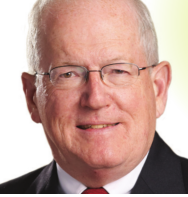Candidates are not addressing state and national fiscal woes
The fun in elections is about personalities, and there is no shortage of fun in 2024, depending on one’s definition of fun.
There is no shortage of interesting personalities among those running for office, national and even state, with a new cast of characters on the Democratic side, and at least one new face on the Republican ticket. What affects most of us is their stance on issues facing our state and nation, and what they plan to do about them.
Looking at national polls in late August, what seems important to voters may not be what candidates are discussing. Indeed, while polls indicate that the economy is the most prominent issue, there is a disconnect. Voters on the one hand expect their personal situation to get worse, but at the same time expect their incomes to rise.
Other issues on the minds of voters are not necessarily what would be expected. They worry about chronic absenteeism in schools and how public schools are doing educating the next generation. In fact, three of five Americans see that as a problem, as such absenteeism has risen alarmingly since the COVID pandemic.
Voters express concern about foreign policy, although how many vote on it is unknown and generally thought to be low. However, they speak about issues in the Middle East with Iran, Israel, Gaza, Lebanon, leading the list. Ukraine, however, may be a more critical issue in the long run. Venezuela and its stolen election gets a little attention, as do dire situations in Africa and the long-run ambitions of China throughout the world.
Interestingly, voters express opinions on the ban on noncompetition agreements by the Federal Trade Commission. More are worried about the threat to Democracy posed by some candidates. This is a higher concern than in prior elections, which should worry all of us.
The proposals of candidates on taxes, like the curious proposals from both parties’ candidates to eliminate taxes on tips, get some attention and general support from voters. That is interesting, since most people receiving tips pay little if any taxes already, but since when did the facts matter? Other tax proposals are generally unpopular, unless it means taxing someone other than the voter being polled.
Increasing the minimum wage is popular, although in most parts of the country, economics have already raised the actual wages higher than the proposed wages. Still, it is good politics.
Consumer confidence is low, expecting a recession sometime soon, or higher than recently, as talk of interest rate reductions are increasing. All that in the face of record highs in the stock markets. However, the actual prices voters see at the supermarket may be more of an influence than their 401(k) balances on a daily basis.
In addition to all of these is the issue of reproductive rights and abortion, which occupies a disproportionate place in the debate and certainly in broadcast ads, the theory being that it is such a polarizing issue that women voters will vote with the Democrats after the overturn of Roe v. Wade and the fact that the issue is on the ballots in key states this fall.
And then there is the general ignorance of the effect of the national debt and deficit, which does not register high in voter concerns.
Whether all these issues will determine the outcome of the national races, or whether it will be a personlity contest, will be interesting to see.
In NH, according to ads, the issues are abortion, affordable housing, out-of-state garbage coming to local landfills, the condition of Manchester under its former mayor, and whether we are going to ban “sanctuary cities,” discourage illegal immigration along the southern and northern borders, and continue “school choice” programs and never have tax increases.
The last few years have benefitted our state with infusions of federal money as the economy was propped up by federal spending. Private businesses, nonprofits and local governments all have received funds in amounts not seen before. However, that gravy train is ending both for the state, local, and private for- and nonprofit budgets, and all those who are working with future budgets know it.
The real issue candidates for state and local office should be addressing is how budgets are going to be fashioned and balanced in light of the expected changes in funding. If spending has to continue at the subsidized rate, without the subsidies, income will have to increase. That income means higher state and local taxes, or higher fees for services.
It is easier for candidates to talk about fighting crime, opposing illegal immigration, banning sanctuary cities and other things. What we should ask them, no matter how attractive or charming, is how they are going to deal with the fiscal issues facing us.
Education issues, reproductive rights, environment, and all the other issues certainly are important, but the basics sometimes are ignored. 2024 may be one of those times when they should not be.
Brad Cook is a Manchester attorney. The views expressed in this column are his own. He can be reached at bradfordcook01@gmail.com.